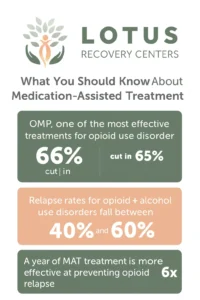You didn’t plan to use again. Maybe you were doing well—hitting 90 days, showing up for group, reconnecting with your family. Then something shifted. A moment of stress. A flash of loneliness. A voice in your head saying just once won’t ruin everything.
But now it’s the morning after. You’re scrolling through recovery pages, reading this blog with a lump in your throat. And that voice has changed: You blew it. You’re back to zero. Why even try again?
If that’s where you are—pause.
Let us tell you something you may not believe right now: You’re not broken. And you’re not back to zero.
At Lotus Recovery Centers, we know that relapse doesn’t erase the progress you’ve made. And more importantly, we know that healing the brain takes time—and support. That’s where Medication-Assisted Treatment (MAT) comes in.
The Truth About Relapse: It’s More Common Than You Think
Let’s clear the air: relapse is not rare. For many people, it’s part of the long, uneven arc of recovery. Not because you’re weak or didn’t try hard enough—but because your brain and body are still adjusting to life without substances.
Relapse is not a moral failure. It’s a neurological, emotional, and behavioral challenge—and one that deserves real tools, not just willpower.
Why Early Recovery Is So Fragile (And What MAT Helps With)
The first 90 days of sobriety are critical—but they’re also chaotic. Even after substances are out of your system, your brain is still struggling to recalibrate.
When you stop using, your brain’s natural reward system has to reboot. Dopamine regulation, impulse control, sleep, and emotional regulation—all of it takes longer than we often expect.
This is why relapse can sneak up—especially when:
- Cravings spike out of nowhere
- Sleep is irregular or absent
- Emotions feel unmanageable
- You’re in new, stressful situations
- Your body is reacting faster than your thoughts can catch up
Medication-Assisted Treatment gives your brain room to catch its breath.
How Medication-Assisted Treatment Works
MAT combines FDA-approved medications with behavioral therapies and supportive care. The medications vary depending on your substance use history (opioids, alcohol, etc.), but they all serve the same purpose: to reduce cravings and stabilize brain chemistry.
Here’s what that can look like:
- For opioids: Buprenorphine or methadone eases withdrawal and reduces cravings
- For alcohol: Naltrexone can block the pleasure response and reduce urges to drink
- For both: MAT helps you feel mentally and emotionally stable enough to engage in therapy, rebuild routines, and reconnect with your why
And no, it doesn’t numb you. Done correctly, MAT helps you feel more like yourself—not less.
“I didn’t think I needed meds—I thought they were a crutch. But after I relapsed, I realized I needed something more than just meetings. MAT gave me a chance to breathe and reset.”
– Alumni, 2023
What MAT Is Not
Let’s bust a few myths:
Myth: It’s just replacing one drug with another
Truth: MAT uses carefully dosed, medically supervised medications to reduce harm—not to create dependence
Myth: If you need meds, you’re not “really” sober
Truth: Sobriety isn’t a competition. Real recovery is about stability, growth, and safety—not purity tests
Myth: MAT means you’ll be on medication forever
Truth: MAT is a tool, not a life sentence. You and your care team will decide together when (and if) tapering makes sense

How MAT Helped One Person Come Back Stronger
Let’s call him Jake. He had 127 days sober before he relapsed after a tough breakup. “I felt like a fraud,” he said. “I couldn’t even look my sponsor in the eye.”
Instead of ghosting the program entirely, he called Lotus. “I was expecting judgment. What I got was relief. They didn’t make me start over—they helped me stabilize.”
Jake started on MAT, worked with his therapist on shame resilience, and reconnected with his alumni group. “It wasn’t a reset. It was a continuation.”
Looking for Medication-Assisted Treatment in Prices Corner, Delaware?
If you’re local to Wilmington or nearby towns like Prices Corner, you don’t have to do this alone. Our Medication-Assisted Treatment program is built to meet you where you are—with no shame, no pressure, and no expectation that you’ve got it all figured out.
We offer:
- Same-week intake options
- Medication options tailored to your needs
- A respectful, experienced team that honors your experience—relapse and all
You’re Not Back at Square One—You’re at a New Beginning
Relapse can make it feel like the clock has reset—but healing doesn’t work that way. Every insight, every hour you didn’t use, every skill you practiced? It’s still in you. This isn’t about starting over. It’s about continuing forward with more tools, more support, and more understanding of what you need.
You don’t have to earn your place back in recovery. You just have to take the next step.
Frequently Asked Questions About Medication-Assisted Treatment
What types of medications are used in MAT?
MAT uses different medications depending on what substances were being used. Common medications include:
- Buprenorphine (Suboxone): Helps reduce cravings and withdrawal symptoms for opioid use
- Methadone: A longer-acting option for stabilizing opioid recovery
- Naltrexone (Vivitrol): Blocks the euphoric effects of alcohol and opioids
- Acamprosate: Supports long-term recovery from alcohol by reducing urges
All medications are prescribed and monitored by trained professionals at Lotus Recovery Centers.
Is MAT safe after a relapse?
Yes. In fact, MAT is often especially helpful after a relapse because it can quickly address biological instability. Restarting MAT under medical supervision is one of the safest ways to get back on track.
Will I be on medication forever?
Not necessarily. Some people stay on MAT long-term, while others taper off after a period of stability. There’s no one right answer—your care team will work with you to create a plan that fits your goals and your biology.
Can I join MAT if I’ve already been through treatment before?
Absolutely. Whether this is your first time seeking support or you’ve been through multiple programs, MAT can be a helpful part of your recovery process.
Is MAT available in Wilmington or Prices Corner?
Yes! Our MAT program is available at our Wilmington location and at our Prices Corner, Delaware facility. Both offer compassionate, personalized care designed to support you without judgment.
📞 Call or Come Back—We’re Still Here for You
Whether it’s your first call or your return visit, you’re welcome here. Healing isn’t linear—and neither is recovery.
Call (833)922-1615 or visit our Medication-Assisted Treatment program page to learn more about MAT services in Wilmington, DE.

